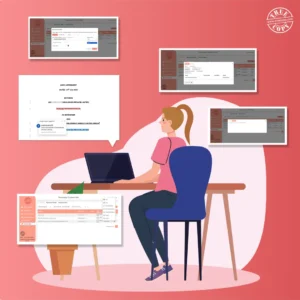Business operations have completely changed with the introduction of electronic signatures (eSignatures), which provide a quick and safe online document signing option. These technological developments will significantly impact the real estate sector with strict documentation requirements. Now that the IT Act, 2000 amendment 2023, has been implemented, real estate companies can use eSign to automate their workflows and guarantee faster, more secure transactions.
Overview of the IT Act Amendment
The Information Technology Act 2000, or IT Act 2000, is a crucial piece of legislation controlling digital contracts and electronic signatures in India. The most recent modifications to the IT Act of 2000 have expanded the use of eSignatures, especially in the real estate industry. This amendment makes it simpler for real estate companies to conduct business online by enabling the use of eSign real estate documents.
Importance of eSignatures in Real Estate

Since eSignatures offer a legitimate way to sign documents electronically, they are essential for the real estate sector. Thanks to the enhanced functionality of eSign brought about by the IT Act, 2000 Amendment, real estate transactions can now be carried out more easily and securely. eSign for realtors and other stakeholders guarantees that transactions are legally binding and finished quickly, regardless of whether you’re a buyer or a realtor.
Understanding the Latest IT Act Amendment
The IT Act, 2000 amendment 2023, has dramatically affected India’s legal environment, especially in the real estate sector. By improving electronic documents’ acceptance and legal standing, this amendment offers a more transparent framework for using eSignatures in real estate transactions.
Impact on the Real Estate Industry
Before this amendment, few and frequently legal ambiguities were associated with using eSign in real estate company transactions. However, the most recent amendments to the IT Act 2000 have lifted many of these obstacles, making real estate eSign software platforms indispensable to real estate transactions. The amendment guarantees legal validity as long as electronic signatures on real estate documents fulfill the requirements outlined in the IT Act 2000.
What Are the Benefits of This Amendment for Real Estate Businesses?
The IT Act Amendment brings several benefits to real estate businesses, making it easier and faster to finalize transactions. Here are some key advantages:
- Efficiency: Transaction times are significantly shortened in India when using eSign Real Estate Documents. Conventional approaches can be laborious because they frequently call for in-person meetings, courier services, and manual signing. With eSign online, documents can be signed instantly anywhere in the world.
- Security: eSignature solutions provide a unique link between the signer and the document and guarantee tamper-proof documents. This lowers the possibility of fraud and offers a safe method for managing private real estate documents.
- Cost Savings: Real estate companies can reduce expenses by implementing eSign procedures. These procedures eliminate the need to print, store, and courier paper documents, making them more economical and sustainable.
- Legal Compliance: The amendment ensures eSignatures comply with the latest legal requirements, providing peace of mind for all parties involved.
- Wider Accessibility: The IT Act 2000’s amendments make it easier for smaller real estate firms to compete with larger companies by providing access to the same eSign software platforms.
Which Property Documents Can Be eSigned Post the Amendment?
The IT Act, 2000 amendment 2023 has expanded the range of real estate documents that can now be eSigned. Here’s a list of the key documents that can be electronically signed:
- Sale Agreements: eSign can now be used to sign contracts between buyers and sellers that specify the conditions of the property sale. As a result, parties can more easily agree on terms without meeting in person.
- Sale Deeds: These legal documents allow for an electronic signature, which expedites and secures the transfer of ownership from the seller to the buyer.
- Lease Agreements: eSign Real Estate Documents now include lease agreements, allowing landlords and tenants to finalize terms quickly and efficiently.
- Encumbrance Certificates: These certificates, which attest to a property’s lack of financial or legal obligations, can now be electronically signed, streamlining the verification process.
- Title Deeds: Proving property ownership is one of the most important aspects of any real estate transaction. In India, electronic signatures on title deeds guarantee the legal recognition of ownership.
- Power of Attorney: This legal document authorizes someone to act on behalf of another in property-related matters and can now be securely eSigned.
- No Objection Certificates (NOCs): NOCs, which are needed from different authorities to guarantee no objections to the real estate transaction, can now be eSigned, expediting the approval procedure.
- Builder-Buyer Agreements: These documents outline the obligations of builders and buyers in real estate projects and can now be electronically signed.
- Mortgage Deeds: Agreements between borrowers and lenders can be eSigned, making the mortgage process quicker and more secure.
Summing up
The most recent amendment to the IT Act 2000, which took effect in 2023, completely changed how real estate deals are made in India. This amendment has resulted in significant cost savings, increased efficiency, and security by enabling eSigning a larger variety of documents for real estate companies. TRUESigner ONE provides a dependable solution to fulfill your eSigning requirements, regardless of whether you want to manage numerous transactions or sign a document online.
The usage of eSignatures will only rise as the real estate sector embraces digital transformation. Thanks to the legal support of the IT Act 2000 and its most recent amendments, real estate companies can confidently utilize eSign practices to streamline their operations and maintain an advantage in a competitive market.
By implementing TRUESigner ONE in your company, you can ensure that all real estate transactions are carried out efficiently and securely and comply with the law. This platform gives you all the resources you need to succeed in the modern digital environment, regardless of whether you work with electronic signatures or eSignatures.



